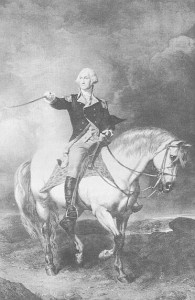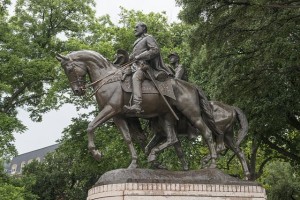The South should be invincible because it is fighting to defend its own soil, not to mention that that the Army of Northern Virginia “was never stronger, physically and morally, than at this very hour.” The people just need to maintain their moral strength. From the Richmond Daily Dispatch February 7, 1865:
Washington’s Dying words.
When George Washington bequeathed to his heirs the sword he had worn in the War of Liberty, he charged them, “Never to take it from the scabbard but in self-defence, or in defence of their country and her freedom; but that when it should thus be drawn, they should never sheath it nor ever give it up, but prefer falling with it in their hands to the relinquishment thereof”–words, says an eminent Englishman, the majesty and simple eloquence of which are not surpassed in the oratory of Athens and Rome.
Let every soldier of the Confederacy engrave those last words of Washington upon his heart. Let them be inscribed in letters of gold upon the capitol of every Confederate State. Let the pulpit proclaim them; let the mother learn them to her children; let them be emblazoned on every banner; ring in every trumpet call, and flash from every sword.
The United States Army and Navy Gazette, in the article transferred to our issue of Saturday, admits that the anxiety for a speedy termination of the war is great in the North as well as in the South, and that it is upon the breaking down of “the will, the moral strength,” of the Confederacy, and not upon simple force of arms, that the United States hopes to conquer a peace.
Those concessions are made, be it remembered, in the face of those successes which have caused such croaking and despondency among the nervous and dyspeptic of our own people, after the defeat of Hood, the capture of Savannah, the triumph, by overwhelming odds, at Fort Fisher. These temporary advantages have not extinguished in Yankee minds memories of Bull Run, the two battles of Manassas, the defeat of McClellan, the defeat of Burnside, the defeat of Hooker, the defeat upon defeat of Grant, who started from the Rapid Ann for Richmond nearly a year ago with the largest army the United States ever has raised, or ever will raise, and has not got here yet. The conquest of such a nation by force of arms, even the United States military leaders see to be impossible, unless the great heart of the country gives way, and our own traitor doubts and fears deliver up the keys of the citadel.
We have never been of those who denied the Yankees the qualities of courage and soldiership. We conceded them those common capacities of all male animals before the war, but we have seen nothing in the war which gives us any new light on the subject. They have everywhere fought us at odds of two or three to one, and often been defeated even with such odds in their favor. We need not even assume, what we believe, that the South are a more military people than the Yankees, or any other race of men.– We attribute our success, under the favor of Divine Providence, to the “moral strength” of a people fighting on their own soil, and for their own firesides, against that “moral weakness” of invaders and aggressors which no ordinary preponderance of numbers can make strong. With those conditions in our favor, the United States may wage this warfare till the crack of doom, and the Confederacy can never be conquered. Our enemies see this as plainly as we do ourselves, though we had scarcely imagined they would have the honesty to confess it.
We have one word to say to the croakers of the Confederacy: If you want to give up the contest, meet, like men, in public assemblies, and say so; but do not paralyze the army with your long faces and deep groans. Do not come from your comfortable dwellings well spread boards and luxurious beds, and chant lamentations to those hopeful heroes who stand in your front, and have endured in your defence such perils and privations as have rarely fallen to the lot of humanity since the beginning of the world. Do not compel them to stand a fire in the rear more pertinacious and harassing than the fire in the front. Do not forever damp with your dismal breath the silver shields of knighthood, flashing so gloriously in the sunlight and reflecting ever the bold lineaments of hope and honor. Go home and go to bed, and dream of subjugation, and die, if you will; but do not be the death of your country.
The Army of General Lee, we are told, was never stronger, physically and morally, than at this very hour. Its nerves are of iron; its spirit is lofty and resolved; it hails with raptures the elevation of its commander to the supreme control of military movements as the harbinger of a new and brilliant career of success and glory. The causes of dissatisfaction that have hitherto existed in the internal conduct of affairs are rapidly disappearing. The right man will be everywhere put in the right place.–Every element of strength in the country will be developed and judiciously handled. Other nations have seen darker days: Rome, Greece, the Netherlands, our own forefathers of ’76; France, when Carnot became War Minister; England, when Mr. Pitt took the helm, and caused a reeling vessel to feel at once the hand of a mighty master, and ride the opposing billows in security and triumph. It is the province of such spirits “from the nettle, Danger, to pluck the flower, Safety.” Providence raises up the man for the time, and a man for this occasion, we believe, has been raised up in Robert E. Lee, the Washington of the second American Revolution, upon whom, from the beginning, all thoughtful eyes have been fixed as the future Deliverer of his country.
Of one thing we are certain, the moral strength of Virginia is as steadfast and immovable as her own Blue Ridge. She did not seek this quarrel; she avoided it by every honorable means of conciliation, by counsels of moderation, by offers of peace. But having taken her ground, she is going to maintain it. She may be overwhelmed by brute force; she may be subjugated, confiscated, exterminated, but she will never be a traitor to herself. Her “moral strength” cannot be broken, and in that “moral strength” she will yet prevail. She has no dream of sheathing the sword of Washington whilst the foot of an invading soldier pollutes her soil. Believing, hoping, daring, she will fight on to the end; calmly, valiantly, confidingly, trusting in Providence to vindicate the Right, and true to herself, her country and her God.


![Lieut. Genl. Ulysses S. Grant: General in Chief of the armies of the United States ( New York : Published by Currier & Ives, [between 1856 and 1907]; LOC: LC-USZC2-2755)](https://www.bluegrayreview.com/wp-content/uploads/2015/02/3b50629r-212x300.jpg)
